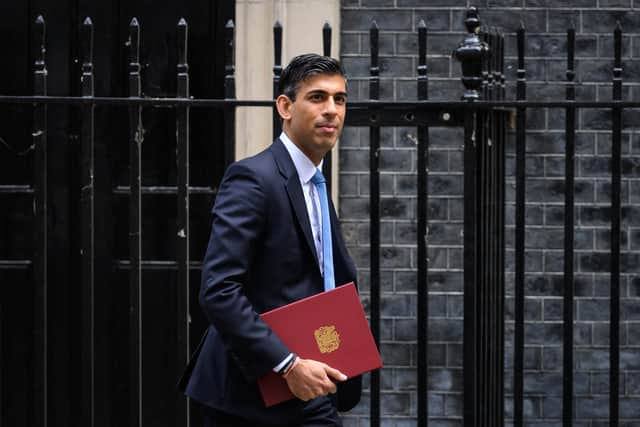Rishi Sunak's Tory government will oversee highest set of tax rises on record, says IFS think tank
and live on Freeview channel 276
Rishi Sunak's Conservative government will have presided over the biggest tax rises on record, according to new analysis by the Institute for Fiscal Studies (IFS).
The think tank has predicted that taxes will rise to around 37% of the national income by the time of the next general election, likely to take place in 2024. This amounts to around £3,500 more per household, however the IFS stipulates that this may not be shared equally among every household.
Advertisement
Hide AdAdvertisement
Hide AdThis is the biggest increase in taxes since comparable records began in the 1950s. On paper, it is the highest level since 1948.
The Prime Minister memorably opposed his predecessor Liz Truss' policy of cutting taxes, particularly for the highest earners. Both his and Chancellor Jeremy Hunt's stubbornness on the issue of reducing taxes has irked some backbench Tory MPs during Sunak's premiership.
Ben Zaranko, a senior research economist at the IFS, criticised the Covid-19 pandemic being given as a reason for the higher taxes in recent years. He also warned that the higher rate may be sticking around for longer, regardless of which party wins the next general election.
Mr Zaranko said: “It is inconceivable that this Parliament will turn out to be anything other than a tax-raising one – and it looks nailed on to be the biggest tax-raising parliament since at least the Second World War.
Advertisement
Hide AdAdvertisement
Hide Ad“This is not, for the most part, a direct consequence of the pandemic. Rather, it reflects decisions to increase Government spending, in part driven by demographic change, pressures on the health service, and some unwinding of austerity.
“It is likely that this Parliament will mark a decisive and permanent shift to a higher-tax economy.”


Mark Franks, the director of welfare at the Nuffield Foundation, added: “There will be strong pressure in coming parliaments to raise taxes further to meet growing demand for public services such as healthcare. Future governments must not only have a credible and robust strategy for the economy and the public finances, but should also be forthright and transparent about the difficult trade-offs they will face.”
The analysis has prompted Labour to respond to the Tories' tax policies. The shadow chief secretary to the Treasury Darren Jones said that the party had "clobbered" the public with soaring tax rates.
Advertisement
Hide AdAdvertisement
Hide AdHe said: “Successive Tory government have overseen 13 years of low growth and stagnant wages. Their response in the face of this bankrupt legacy is always to load their failure onto working people. And what are we getting back? Crumbling public services.
“Brits are working hard but getting clobbered with 25 Tory tax rises and a continuing Conservative premium on their household budgets.”
The words were echoed by the Liberal Democrats, with treasury spokesperson Sarah Olney adding: “This Conservative Government crashed the economy and is making the public pay the price. This is the same party which promised not to raise people’s taxes and is now taxing families through the nose."
A Treasury spokesperson said: “Despite needing to take the difficult decisions to restore public finances in the face of the dual shocks of the pandemic and Putin’s illegal invasion of Ukraine, the latest data shows our tax burden will remain lower than any major European economy.
Advertisement
Hide AdAdvertisement
Hide Ad“Driving down inflation is the most effective tax cut we can deliver right now, which is why we are sticking to our plan to halve it, rather than making it worse by borrowing money to fund tax cuts. We have also taken three million people out of paying tax altogether since 2010 through raising personal thresholds, and the Chancellor has said he wants to lower the tax burden further – but has been clear that sound money must come first.”
